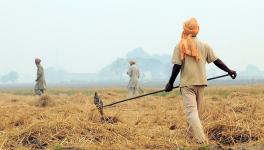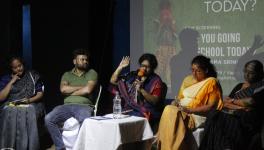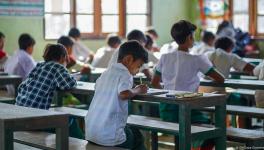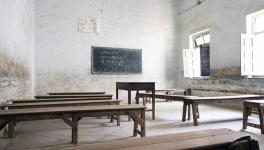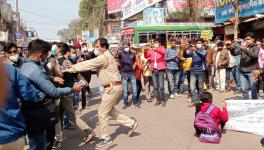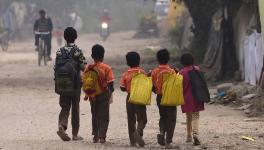‘Dehumanising Experience’: How COVID Impacted Lives of Students in India
Image Credit: Ekjut NGO
Haleem Sherif, 22, a resident of Kerala’s Kannur district, had never imagined that his desire to attend Jawaharlal Nehru University (JNU) in Delhi would remain a dream even after getting admission into the University. Sherif, a first year Masters’ student at JNU is disappointed as he is yet to set foot on campus and experience the culture of one of India’s most prestigious universities.
Sherif says it has been an underwhelming experience. “We are missing out on so much. Not only the campus life but the exchange of ideas and the social interaction,” he tells Newsclick.
He fears that his two years of Master’s degree will be completed online, and he will regret it for the rest of his life. “I worked hard to gain admission into the university. Exams for the first semester has ended. Almost a year has passed while I have been glued to my laptop screen. It is quite disappointing,” he says.
With a bleak scope for the Universities, colleges and schools to re-open any time soon, the student community in India has been hit hard by the ongoing pandemic as their learning has moved online in the backdrop of COVID-19 infections. Many students Newsclick spoke with expressed concerns about the impact online education has on their studies and social life. Many students are yet to come to terms with the unpredictable life being offered under COVID-19.
The closure of schools and colleges in India has exposed myriad of issues weighing down the education system including accessibility to online education, low quality of learning, caste and class disparities, teachers and students apathy and health concerns.
Lack of Interactions
Simran Varma, 25, a MA final year student at Delhi’s Ambedkar University, returned to online classes after a month’s absence and only after her teachers contacted her. The classes, she claims, have been an alienating experience for her.
“All lectures are online. It was quite isolating. I didn’t feel like attending the classes. It was getting to me. After my teachers contacted me, I felt obligated to attend,” she says.
Varma enrolled at Ambedkar University in 2019 and had the opportunity to experience a few months of college life. For her, the entire experience of online classes has been a “dehumanising” one. She says that the interaction between the students and the professors has been significantly impacted.
“The interaction between teachers and students has disappeared. Usually, when it is a physical class, you meet your professors when you have a doubt or meet your friends at canteen to discuss. When we talk about going to college it is not just books and classes but also the interaction.”
Varma’s experience echoes the experience of many students for whom online classes are marked by uncertainty, alienation, and a reduced quality of education.
Inaccessibility to Online Education
For the students in Jharkhand which has the highest tribal population, the experience has been very different and difficult. With no access to mobile phones and internet, Madhan Machuwa, son of a daily wager from Matkobera village of Jharkhand’s West Singhbhum district, had almost planned to drop out of the college when a youth volunteer Madru Machuwa from the NGO Ekjut intervened.
“Madru bhaiya gave me a mobile phone and helped me pursue my education. Else I had decided to drop out of the class and join my father as a daily wager,” Madhan says.
According to the UNICEF, COVID-19 has triggered a negative chain reaction hurting the most disadvantaged. Globally, over 290 million children are out of school and only 1 in 4 have access to digital learning.
“Our youth volunteers have distributed 91 mobile phones in 50 tribal villages and using this, 2,753 adolescents are continuing online education in batches. These mobile phones are shared between students. The charges of internet are taken care by the organisation. We are encouraging students to study online as education has transformed due to COVID,” says Suchitra Rath, Program Lead Adolescent initiative, Ekjut.
Rath says, the Yuva Sathi (Youth Volunteers) are playing a very crucial role by acting as intermediate between students and the organisation. “The Jharkhand online portal has downloadable links which are downloaded by the youth volunteers helping students to access education,” she adds.
Impact on Physical Health
Students who spend hours online have expressed concerns about their physical health and stress triggered due to hours of staring at the screen. For a 11th standard student in Ghaziabad, Ritvik Koul, his eyes are hurting badly.
“I frequently have headaches and my eyes hurt because of the online nature of classes. The homework load has also increased so much that even after the class ends, we are again staring at the screen to finish our homework,” he says.
Koul considers himself lucky after the CBSE’s latest announced evaluation pattern for class 12. The CBSE had announced that evaluation of Class 12 students would be on the basis of marks obtained in class 11 and 10. The results will be tabulated considering 30% marks from Class 10, 30% from Class 11 and 40% from Class 12.
“To consider percentages from Class 10 and 11 is unfair. Many students don’t study in class 11 and work hard in Class 12. Now, they will have to bear the brunt of the easy going attitude they exhibited in Class 12. Many of my seniors were disappointed,” Koul said.
Weak Internet Connection:
In Jammu and Kashmir, where the internet accessibility is unreliable, teachers and students are facing significant challenges due to inconsistency of internet. In Srinagar, Nasir Ali khan, father of Mariyam (6) and Ali (8) recalls his son being on the verge of crying when his online class was disconnected because of weak connection.
“As a father what could have I done? He was learning Mathematics online when his connection acted up and he could not connect for the next five minutes. And in those five minutes, the teacher had finished the topic and moved on to another,” he says.
Nasir underlines that “the online class is not an alternative to physical class” but at the moment, parents, students and teachers cannot do much about it.
“For working parents, it’s a task to keep a phone at home and many cannot even afford that. And such young children are to be kept under constant supervision,” he adds.
Gaping Rural-Urban Divide:
Since the COVID pandemic wreaked havoc in India, online education has become a necessity. As per UNICEF, 1.5 million schools have closed due to the pandemic affecting 247 million children enrolled in elementary and secondary schools. It has noted that “online education is not an option for all and pre-COVID, only a quarter of households (24%) in India had access to the internet and there is a large rural-urban and gender divide.”
While the privileged students are smoothly navigating the digital schooling world, the situation is difficult for disadvantaged families.
Satish Bhagat, educational counsellor in Jammu whose focus has been on SC/ST students, says that during his counselling sessions, half of the students did not attend the class because of unavailability of mobile phones or internet.
“Students are asking me to meet them in person and then counsel them. Few are saying their fathers have a smartphone but they do not know how to use it. These students are from poor backgrounds and are still coming to terms with this unprecedented shift to online education,” Bhagat says.
Satish’s wife, Jhalkari Vidrohi, who is a tutor, helps students with homework, which she receives on her phone. “The students do not have phones. So my number has been given to almost 15 students whose homework I receive and then help students to complete,” says Vidrohi.
While online education has posed difficulty for every student, it has sadly also exposed the gaping rural-urban divide in India.
Get the latest reports & analysis with people's perspective on Protests, movements & deep analytical videos, discussions of the current affairs in your Telegram app. Subscribe to NewsClick's Telegram channel & get Real-Time updates on stories, as they get published on our website.










